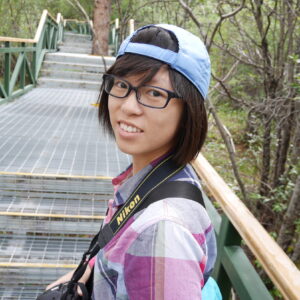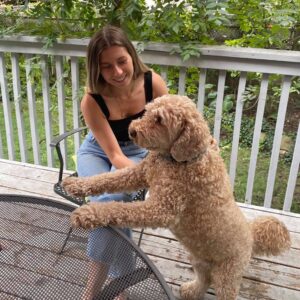Congratulations to the Graduate Program in Neuroscience (GPN) fall class of 2022! Seven trainees are graduating this week and to celebrate, we asked them for some of their favourite memories during their time at UBC and advice for future students.

Ellen Koch, PhD
Supervisor: Dr. Lynn Raymond
Thesis title: Altered Cortico-Striatal Signaling and Motor Behaviour in the YAC128 Mouse Model of Huntington Disease
Summary of research: I used in vivo and slice imaging techniques to determine how signalling in the striatum is affected in Huntington’s disease mouse models, and how this relates to symptoms of this disease including motor learning deficits.
Favourite GPN memory: One of my favourite memories during my time in graduate school was probably going to my first international conference in 2018 in Washington, D.C. It was so inspiring to hear about all of the groundbreaking research going on all over the world, talk to other researchers about our projects, and meet people at the various events and socials going on every day. Another recent event that I enjoyed was the DMCBH research retreat in Kelowna, and I am happy to hear that the centre will be holding more of these retreats in the future!
Advice for future students: I would advise future students to try their best to just enjoy the experience of graduate school. It is easy to get caught up in daily stressors and worries, and to feel like you need to have perfect results or have many different experiments in your thesis before you can graduate. But the process of getting your PhD is more about learning the skills along the way, rather than having a perfect final product. My thesis did not end up including a lot of content that I originally expected to include, often because those experiments didn’t work out, I didn’t have time, or I decided to go a different direction. But I still learned so many valuable skills throughout my PhD, even if they didn’t all end up going towards my thesis or a published paper.

Xiuyun Wu, PhD
Supervisor: Dr. Miriam Spering
Thesis title: Motion processing across spatial and temporal scales for human perception and eye movements
Summary of research: I studied the relationship between human visual perception and motor action, by examining how perception and eye movements respond to different visual objects and tasks. This research provides new insights into how visual information is utilized by the perception and action system, and can inform our understanding of healthy and pathological brain mechanisms underlying vision and action.
Favourite GPN memory: The NRSC soccer/futsal team! We were not competitive at all, but I had fun 🙂
Advice for future students: Believe in yourself, regardless of what happens. You can always make tomorrow a better day!

Qing Zhang, PhD
Supervisor: Drs. Weihong Song and Brian MacVicar
Thesis title: Regulation of CNTNAP2 expression and modification and its role in autism spectrum disorders
Summary of research: My research defined the mechanisms underlying the transcription, modification, and degradation of CNTNAP2, a critical molecule in autism. I discovered that impaired modification of the molecule contributes to autism pathogenesis. This research provides novel insights into potential targeted therapy for autism.
Favourite GPN memory: My favourite memories in GPN were the good times at some events with my lab mates and friends, like the lab retreat to Whistler, the conference in Montreal, the Christmas Market, and walks on the beautiful campus.
Advice for future students: There are many challenges in graduate studies. Keep positive and follow your heart. We can make it!

Parsa Delavari, MSc
Supervisor: Dr. Ipek Oruc
Thesis title: Explainable diagnosis using deep-learning: classification of fundus images as a promising tool for early detection of Alzheimer’s disease
Summary of research: Artificial intelligence (AI) has recently successfully detected Alzheimer’s disease based on images taken from the retina, which are easily accessible. However, the hallmarks of this disease in the retina have yet to be identified. I proposed a methodology to reveal the visual cues in the retinal images used by AI to predict the labels. Because of data limitations, patient’s sex was used as an alternative label to validate the proposed methodology. The results uncovered the retinal parameters that significantly differ between males and females, while patient’s sex is invisible to human experts in this imaging modality. The same method can be applied to Alzheimer’s disease to reveal its retinal manifestation when sufficient data is available.
Favourite GPN memory: My favourite GPN memory goes back to the summer of 2021 when we had the first gathering of Neuroscience students after the pandemic. It was a sweet pizza party hosted by the Neuroscience Trainee Association at beautiful Jericho Beach. I had the chance to meet my cohort in person for the first time and we ended the event with a fun volleyball game.
Advice for future students: UBC is full of wonderful opportunities, both academic and extracurricular. As an MSc student who had to spend half of my study time remotely, I would definitely advise future students to live and enjoy every single moment of in-person life at UBC.
 Alexandra Pavel, MSc
Alexandra Pavel, MSc
Supervisor: Dr. Jon Stoessl
Thesis title: Functional segregation in Parkinson’s disease
Summary of research: The striatum is an integral component of the basal ganglia that, in addition to facilitating movement, coordinates many aspects of cognition. In Parkinson’s disease (PD), dopaminergic projections innervating the striatum degenerate in a selective manner. While a back-to-front pattern of progression is supported by previous imaging studies, the possibility of an additional top-to-bottom gradient is less established. Considering the pattern of mapping in the brain, one would expect initial motor deficits in the lower limbs. However, PD symptoms typically begin in the arm or hand. As well, the striatum’s various cognitive and motor purposes are segregated by function and anatomy in the healthy brain, but what about in PD? The project I worked on as part of my master’s thesis aimed to study altered striatal plasticity in early-stage PD versus healthy controls using hybrid neuroimaging, to delineate functional reorganization of dopaminergic connections in PD.
Favourite GPN memory: Playing frisbee during the Neuroscience Trainee Association beach day at Jericho last summer!
Advice for future students: Don’t be afraid to ask for help and seek advice from members of your research team! And find hobbies and activities that bring you joy and help you decompress from work related stress.
Hannah Phillips, MSc
Supervisor: Drs. Ruth Grunau and Steven Miller
Thesis title: Early pain/stress and math skills in relation to fMRI during visuospatial processing at age 8 years in children born very preterm
Mark Bichin, MSc
Supervisor: Dr. Ruth Grunau
Thesis title: Hippocampus, amygdala, and thalamus volumes in very preterm children at 8 years: neonatal pain and genetic variation



